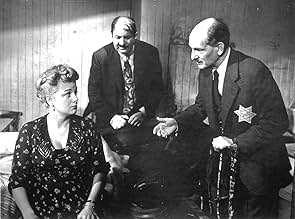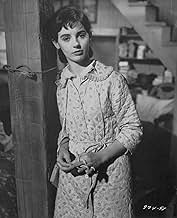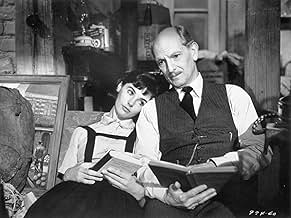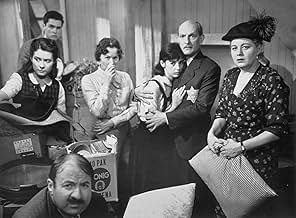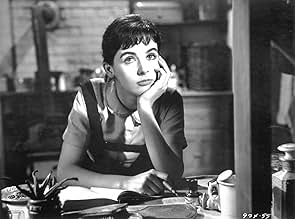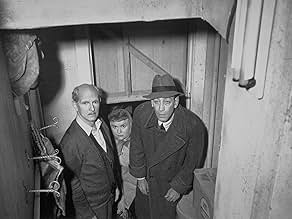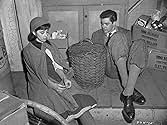Pendant la Seconde Guerre mondiale, une adolescente juive du nom d'Anne Frank et sa famille sont obligés de se cacher dans la Hollande occupée par les nazis.Pendant la Seconde Guerre mondiale, une adolescente juive du nom d'Anne Frank et sa famille sont obligés de se cacher dans la Hollande occupée par les nazis.Pendant la Seconde Guerre mondiale, une adolescente juive du nom d'Anne Frank et sa famille sont obligés de se cacher dans la Hollande occupée par les nazis.
- A remporté 3 oscars
- 9 victoires et 14 nominations au total
- Miep Gies
- (as Dody Heath)
- Dutch Workman
- (uncredited)
- SS Man
- (uncredited)
- Dutch Workman
- (uncredited)
- SS Man
- (uncredited)
- Sanne Devries
- (uncredited)
- Workman in Shop
- (uncredited)
- British Radio Announcer
- (voice)
- (uncredited)
Avis en vedette
Three members of the original Broadway cast did their roles for the screen, Joseph Schildkraut, Lou Jacobi, and Gusti Huber. Joseph Schildkraut as Otto Frank is the backbone of the film, providing the moral authority in the cast. He's a teacher and a scholar and makes sure that even under these circumstances, the education of his daughters is not neglected. Gusti Huber is Mrs. Frank and Lou Jacobi is Mr. Van Daan.
The Van Daans and the Franks have been offered shelter in a third floor apartment that is kept secret by a hidden door in a factory owner. The owner Mr. Kraler played by Douglas Spencer is an anti-Nazi and has offered to keep these two Jewish families hidden for the duration of the war in Holland. For two years they live in that apartment and aside from radio news all they know of the outside world is that street in Amsterdam where the factory is located. Director George Stevens to keep the viewer from getting claustrophobic provides us with occasional shots of the outside street and canal. This film is the ultimate in cabin fever.
But it has to be so for the Van Daans and the Franks are hiding for their lives. It's a community of necessity that's created up in the third floor.
Young Millie Perkins does fine in the title role originated on Broadway by Susan Strassberg. She has an Audrey Hepburn like appeal, but never had the career Audrey certainly did. Her sister Margit is played by Diane Baker who's career was a bit more substantial. Two very normal average teenage girls, except that Anne has a talent for writing and observing.
The frightening thing about this film is the very ordinariness of the characters. What have these people ever done that the might of the Nazi war machine should be out looking for them? Some of them are certainly not noble specimens as the movie shows, but their lives are so humdrum like millions of us. Simply because for politics sake, someone was scapegoating a religion.
Ed Wynn as Drussel the dentist and Shelley Winters as Mrs. Van Daan were nominated for supporting players in the male and female categories that year. Wynn lost, but Winters won the first of her two Oscars for this film. Up to then Ms. Winters played some pretty brassy characters in film. She fought for and won this role and got acclaim worldwide for her portrayal as a wife and mother. It was a transition into those kind of roles for her.
So Anne observed and wrote about her impressions of what she saw and heard and the people around her for two years. In a sense this is like Moby Dick with the Pequod being the apartment and the white whale being the Nazis. Joseph Schildkraut is no Ahab, he's just trying to lead his community for survival.
When the Nazis come, Anne's diary is hidden and after the war one of the community comes back and like Ishmael retrieves the diary and very much tells the tale.
Anne's diary, the hopes and dreams of a teenage girl caught up in a world of hate she couldn't comprehend, is now classic literature. It serves as a dark reminder of the bestial nature we can sink to. And it reminds us that hope, courage and love can spring from the darkest places.
The book was made into a successful play and then transfered to the screen where it was shortened considerably from the original. And that is where I saw it first, on the screen, but the shorter version, not being aware of the original length.
The cast are amazing, particularly Millie Perkins, who was the least experienced of all the cast and has to be in almost every scene. She candidly shared her experience of the six months' filming when the cast was virtually in captivity and mentioned in passing that the most difficult time she had was not surprisingly with the director, George Stevens, who was extremely supportive but rather with Joseph Schildkraut, who plays Otto Frank, her father in it. He made her life hell on set and never let her forget she was totally inexperienced, unlike the rest of them, in the way of acting. I'm mentioning this as not an inkling of this tension comes across on screen, and Millie has to share a lot of loving scenes with Joseph. Only a gifted actress could overcome her distaste for the man and perform as she did.
The expanded version of the movie is remarkable. It engenders a claustrophobic feeling in the viewer and an overwhelming sadness, knowing that none of these characters, apart from Otto, will survive the madness of the camps.
Anne's positive spirit drenches every scene, she believes in the intrinsic goodness of everyone in spite of everything.
Shelley, as Peter's mother, deserved her Oscar, she conveys her unhappy marriage, her reliance on the material, her love for her son, so well. Diane Baker, as Margot, Anne's sister, hands in a great performance as does the above mentioned Joseph. Ed Wynn, breaking type, plays Dussell the dentist as an irritating busybody.
In the way of the Oscars, so many superb movies fail to attain the best picture of the year. This is one of them. That year, the best picture Oscar went to Ben Hur. This is a far superior movie.
9 out of 10. Superb, especially in the restored length. Not to be missed. B&W at its finest.
As the story goes, Stevens saw model Millie on a magazine cover, fell in love with her expressive eyes, and theorized that this unknown would be more effective than an established star to portray Anne.
Though Perkins had no acting experience, Stevens--at the peak of his career--was confident that he could teach Millie to act, at least for this film.
Although Audrey Hepburn was very interested in the part (as was Stevens in her) Stevens finally decided that it would be more effective to use a fresh actor--one with whom the public would have no pre-conceptions. (Other successful cases to support his theory being Hurd Hatfield as Dorian Gray and Robert Alda as George Gershwin.) Still, it was a huge gamble, since Anne was the pivotal role in this major production.
Well, the results are now history. For many moviegoers Perkins was just fine. While some critics easily spotted her reedy inexperience and rather sympathized with her being thrust into a super-professional arena, they conceded that Millie did do a commendable job.
Unfortunately, Perkins took a lashing from most critics, and her subsequent acting career has been relegated to minor roles in "B" films. Those are the "breaks," though in the fickle film world.
Yet, with all this, many people still think of Perkins' countenance when they envision of Anne Frank. So she and Stevens made a lasting impression.
Likewise, for many, this production remains the definitive version of a profoundly touching World War II real-life chronicle.
Le saviez-vous
- AnecdotesAudrey Hepburn was first offered the role of Anne Frank, and Otto Frank was among those who nominated her. She refused it for three reasons. Firstly, she had decided to accept the role in Vertes demeures (1959). Secondly, she had lived in occupied The Netherlands during the war and had seen the Nazis carry out street executions and watched as they herded Jews onto boxcars to carry them to concentration camps. She knew that making the film would bring back memories that were far too painful for her. However, thirdly, she was 30 and felt that she was too old to play a teenage character convincingly on screen.
- GaffesAnne Frank was given the diary for her thirteenth birthday, a few days before they all went into hiding and not after going into hiding as depicted in the film.
- Citations
Anne Frank: I know it's terrible trying to have any faith when people are doing such horrible... But you know what I sometimes think? I think the world may be going through a phase, the way I was with mother. It'll pass. Maybe not hundreds of years, but someday. - I still believe, in spite of everything, that people are really good at heart.
- Générique farfeluAt the end, neither a "The End" credit nor a cast list appears, only the title of the film once more ("The Diary of Anne Frank").
- Autres versionsOriginally released at 170 minutes, then later cut and available only in 156-minutes version. Complete edition has been recently restored on video.
- ConnexionsFeatured in George Stevens: A Filmmaker's Journey (1984)
- Bandes originalesBerg op zoom
(uncredited)
Traditional
Meilleurs choix
- How long is The Diary of Anne Frank?Propulsé par Alexa
- Is 'The Diary of Anne Frank' based on a book?
- How old was Anne Frank when the family first went into hiding?
- How many people go into hiding with the Franks?
Détails
Box-office
- Budget
- 3 800 000 $ US (estimation)
- Durée3 heures
- Couleur
- Rapport de forme
- 2.35 : 1
Contribuer à cette page



